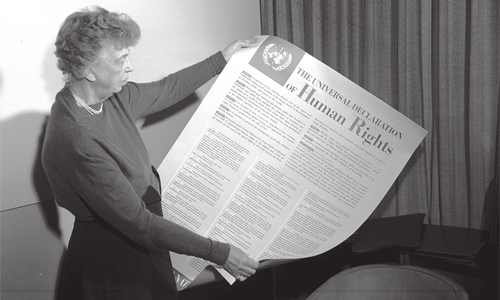Human rights are as important as it may override any enacted laws and regulation in national and international level. Human rights are commonly considered as inalienable and fundamental rights to which a person is inherently entitled simply because she or he is a human being regardless of his/her nation, location, language, religion, ethnic origin, or any other status. Human rights are applicable everywhere and every time in the sense of being universal and egalitarian in the sense of being the same for everyone. Overall, human rights are one the most important achievements of human being widely used for protection of individual’s rights and freedom against oppression of any government or non-government actors.
Historically, there were three major steps for development of human rights; from the ancient Greek age up to the modern era, human rights were equal to natural law and ancient people believed that essential rights such as rights of life, education, belief, expression and equality and so on are donated by nature. In modern era, it inclined to social contract and rationality. During this step, the national law not only critiqued or refused, but also the relation between law and ethics and law and religion was disconnected. After Second World War, specifically after establishment of united nation, once again the natural human right was revived and recognized.
Generally, human rights law has prevented from many tragedies and the human rights principles are considered as cornerstone of international human rights law. This principle, as first emphasized in the Universal Declaration on Human Rights in 1948, has been reiterated in numerous international human rights conventions, declarations, and resolutions. The 1993 Vienna World Conference on Human Rights, for example, noted that it is the duty of States to promote and protect all human rights and fundamental freedoms, regardless of their political, economic and cultural systems. All States have ratified at least one, and 80% of States have ratified four or more, of the core human rights treaties, reflecting consent of States which creates legal obligations for them and giving concrete expression to universality. Some fundamental human rights norms enjoy universal protection by customary international law across all boundaries and civilizations. Human rights are inalienable. They should not be taken away, except in specific situations and according to due process. For example, the right to liberty may be restricted if a person is found guilty of a crime by a court of law.
In order to get more familiarity with human rights we need to discuss about the main features and principles of human rights. Firstly, human rights are universal and inalienable. All people everywhere in the world are entitled to them. The universality of human rights is encompassed in the words of Article 1 of the Universal Declaration of Human Rights: “All human beings are born free and equal in dignity and rights.” Indivisibility: human rights are indivisible. Whether they relate to civil, cultural, economic, political or social issues, human rights are inherent to the dignity of every human person. Consequently, all human rights have equal status, and cannot be positioned in a hierarchical order. Denial of one right invariably impedes enjoyment of other rights. Thus, the right of everyone to an adequate standard of living cannot be compromised at the expense of other rights, such as the right to health or the right to education.
Secondly, human rights are interdependent and interrelated. Each one contributes to the realization of a person’s human dignity through the satisfaction of his or her developmental, physical, psychological and spiritual needs. The fulfillment of one right often depends, wholly or in part, upon the fulfillment of others. For instance, fulfillment of the right to health may depend, in certain circumstances, on fulfillment of the right to development, to education or to information.
Thirdly, all individuals are equal as human beings and by virtue of the inherent dignity of each human person. No one, therefore, should suffer discrimination on the basis of race, colour, ethnicity, gender, age, language, sexual orientation, religion, political or other opinion, national, social or geographical origin, disability, property, birth or other status as established by human rights standards.
Fourthly, all people have the right to participate in and access information relating to the decision-making processes that affect their lives and well-being. Rights-based approaches require a high degree of participation by communities, civil society, minorities, women, young people, indigenous peoples and other identified groups.
Fifthly, all states and other duty-bearers are accountable for the observance of human rights. In this regard, they have to comply with the legal norms and standards enshrined in international human rights instruments. Where they fail to do so, aggrieved rights-holders are entitled to institute proceedings for appropriate redress before a competent court or other adjudicator in accordance with the rules and procedures provided by law. Individuals, the media, civil society and the international community play important roles in holding governments accountable for their obligation to uphold human rights.
In short, human rights are universal and inalienable, indivisible, interdependent and interrelated. They are universal because everyone is born with and possesses the same rights, regardless of where they live, their gender or race, or their religious, cultural or ethnic background. Human rights are Inalienable because people’s rights can never be taken away. Indivisible and interdependent because all rights – political, civil, social, cultural and economic – are equal in importance and none can be fully enjoyed without the others. They apply to all equally, and all have the right to participate in decisions that affect their lives. They are upheld by the rule of law and strengthened through legitimate claims for duty-bearers to be accountable to international standards.
Home » Opinion » The Role and Importance of Human Rights Laws
The Role and Importance of Human Rights Laws
| Mohammad Zahir Akbari

